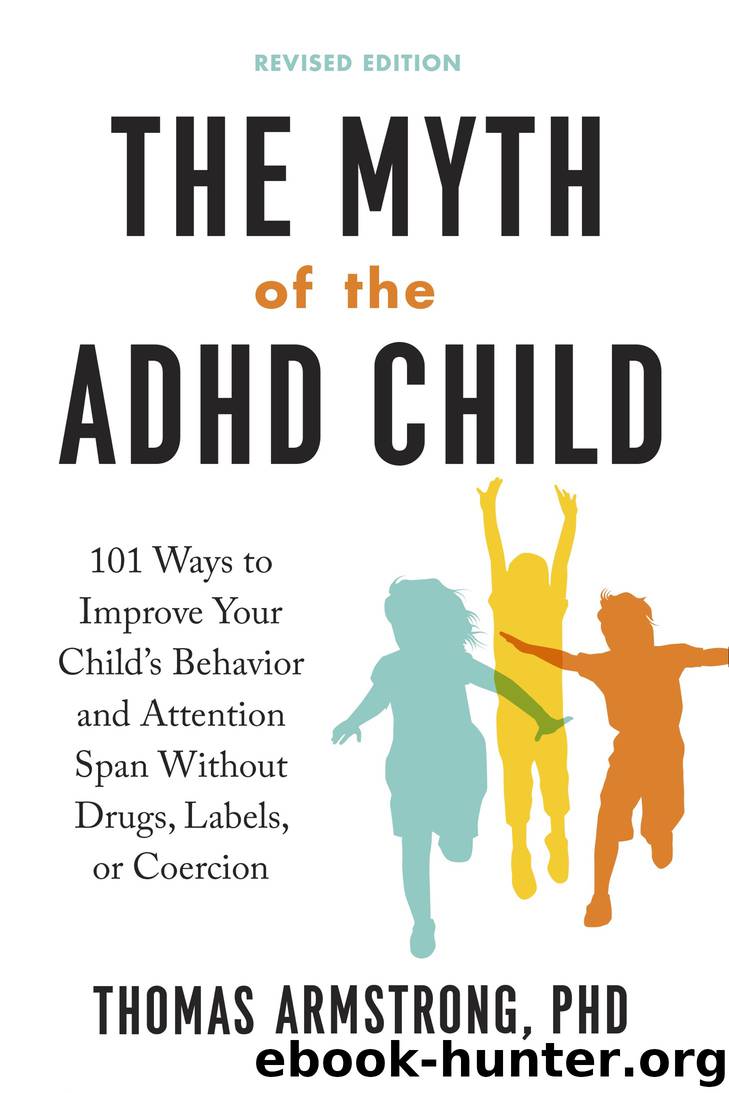The Myth of the ADHD Child by Thomas Armstrong

Author:Thomas Armstrong
Language: eng
Format: epub
Publisher: Penguin Publishing Group
Published: 2017-08-29T04:00:00+00:00
FOR FURTHER INFORMATION
Android Apps on Google Play: https://play.google.com/store/apps?hl=en.
Apple Apps Store: https://itunes.apple.com/us/genre/ios/id36?mt=8.
STRATEGY #48
Match Your Child with a Mentor
(Ages 8–16)
Kids need older role models to help them surmount many of the challenges and obstacles that life presents. Mentors can also inspire youth to acquire the positive qualities needed for success in the adult world. This is why the elders of indigenous cultures have for millennia been putting older children and adolescents through rites of passage to separate them from their parents, isolate them in challenging environments, and integrate them back into the culture as full-fledged adults. While the ancient practices of traditional societies for the most part no longer have a place in today’s modern world, kids who struggle with attention and behavior issues have an even greater need for this kind of adult-supervised direction.
Informal mentoring programs, where middle school and high school kids are matched with college students, adult volunteers, or older retirees, can make a big difference in normalizing behavior and creating focus and direction in a such a young person’s life. Eye to Eye is a national coalition of mentoring groups that matches kids diagnosed with ADHD and learning disabilities with college students who have a similar diagnosis. Research conducted at Columbia University’s Teachers College reveals that 88 percent of students who go through the Eye to Eye program feel better about themselves, 93 percent report that their mentor was the kind of student they wanted to be, and 86 percent reported that “being a part of Eye to Eye got me to think about what I am good at.”1 Mentoring programs for kids diagnosed with ADHD have also been associated with improvements in academic performance and school attendance.2
Mentoring is different from tutoring, which focuses almost exclusively on developing school-related skills. Instead, mentors spend time hanging out with their mentees, talking about hopes, fears, life goals, and anything else that comes up, as well as sharing mutual interests and activities. Marcus Soutra, a photographer who was diagnosed with ADHD and dyslexia in childhood, shares how his school “matched me up with a 25-year-old commercial photographer who became my mentor. My mentor didn’t have learning or attention issues. Yet we bonded over our common interest in photography. We got to know each other. He let me use his camera and darkroom. When we met, we talked about how to take the best shots, how cameras worked and our favorite photographs. Working with him helped me find success outside of school. I’ll never forget selling my first photo—it sure made up for all those poor grades on spelling tests!”3 Although Soutra’s experience was with a non-ADHD-identified individual, he suggests that there is a benefit to having someone as a mentor who shares your diagnosis. He writes: “It’s important for your child to have someone in her life who can relate to her struggles with learning and attention issues. That can be anyone—a friend, a family member or an older classmate. Your child can even have more than one mentor.”4 Look for
Download
This site does not store any files on its server. We only index and link to content provided by other sites. Please contact the content providers to delete copyright contents if any and email us, we'll remove relevant links or contents immediately.
| Administration & Medicine Economics | Allied Health Professions |
| Basic Sciences | Dentistry |
| History | Medical Informatics |
| Medicine | Nursing |
| Pharmacology | Psychology |
| Research | Veterinary Medicine |
Periodization Training for Sports by Tudor Bompa(8274)
Why We Sleep: Unlocking the Power of Sleep and Dreams by Matthew Walker(6726)
Paper Towns by Green John(5191)
The Immortal Life of Henrietta Lacks by Rebecca Skloot(4589)
The Sports Rules Book by Human Kinetics(4389)
Dynamic Alignment Through Imagery by Eric Franklin(4217)
ACSM's Complete Guide to Fitness & Health by ACSM(4060)
Kaplan MCAT Organic Chemistry Review: Created for MCAT 2015 (Kaplan Test Prep) by Kaplan(4014)
Introduction to Kinesiology by Shirl J. Hoffman(3776)
Livewired by David Eagleman(3775)
The Death of the Heart by Elizabeth Bowen(3622)
The River of Consciousness by Oliver Sacks(3606)
Alchemy and Alchemists by C. J. S. Thompson(3522)
Bad Pharma by Ben Goldacre(3428)
Descartes' Error by Antonio Damasio(3279)
The Emperor of All Maladies: A Biography of Cancer by Siddhartha Mukherjee(3164)
The Gene: An Intimate History by Siddhartha Mukherjee(3099)
The Fate of Rome: Climate, Disease, and the End of an Empire (The Princeton History of the Ancient World) by Kyle Harper(3067)
Kaplan MCAT Behavioral Sciences Review: Created for MCAT 2015 (Kaplan Test Prep) by Kaplan(2987)
